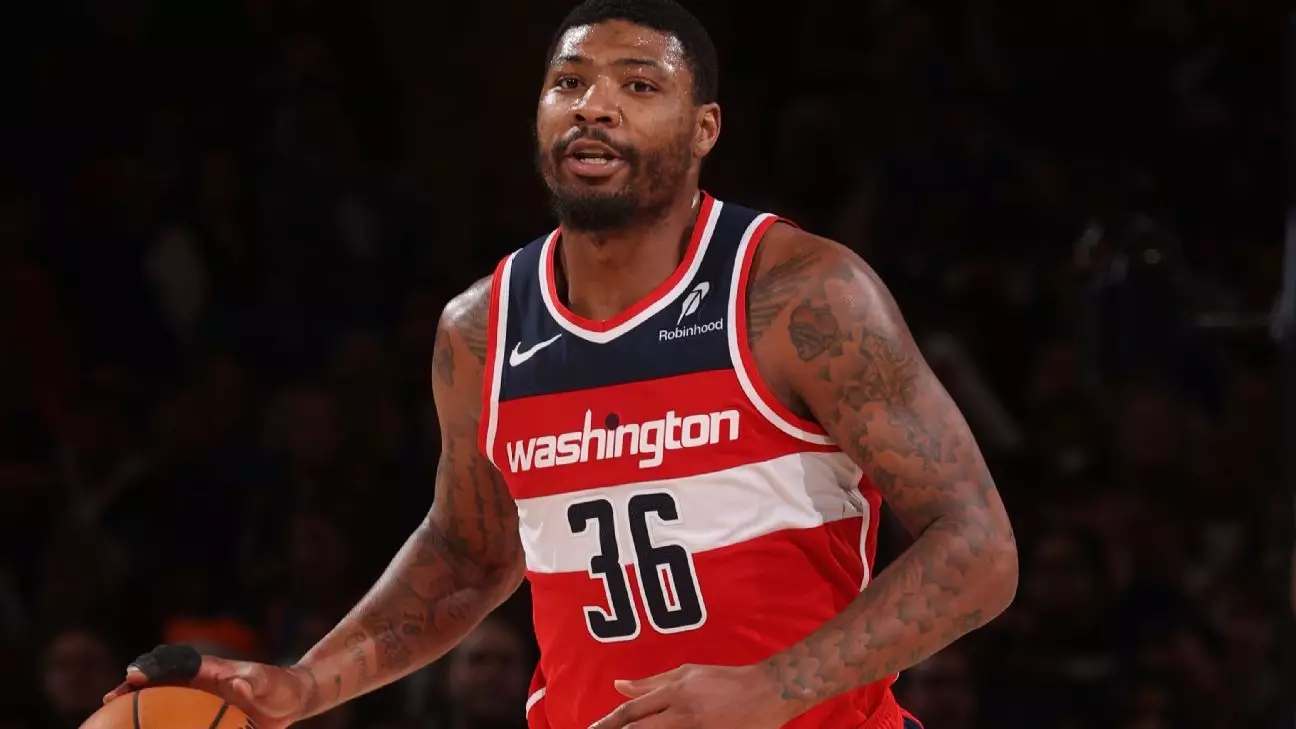In the vibrant world of professional sports, where passion and rivalry converge, the fine line between fervor and fanaticism can often get overshadowed. Recently, during a game at TD Garden, former Celtics guard Marcus Smart found himself embroiled in a heated exchange that showcased just how problematic fan behavior can be. The incident exposed not only the emotional stakes of these high-stakes sporting events but also the dangers of losing sight of sportsmanship. When a fan began harassing the Washington Wizards bench, Smart took it upon himself to point out the offending individual to security, who then escorted the fan from the premises. This incident highlights a growing concern: the normalization of toxic fan behavior is becoming alarmingly prevalent in our arenas.
The Emotional Toll on Players
Marcus Smart’s reaction was poignant for several reasons. First and foremost, he emphasized the principles of respect and boundaries, stating, “He just crossed the line. We all know, I don’t do line crossing.” In a world where athletes are often reduced to mere entertainers, it is refreshing to see someone defending their dignity and mental well-being. Smart’s passion is worth celebrating, particularly as a player who dedicated nine years of his career to Boston. His emotional tie to the city was on full display as he navigated the complexities of returning home as a member of a rival team. “It’s definitely emotional coming back,” Smart reflected, affirming the deep-rooted connection he has with the Boston community.
Such moments are vital; they remind us that behind the athletes are humans—individuals wrestling with their pasts, identities, and responsibilities. Smart’s emotional responses are reflective of athletes everywhere who grapple with expectations from fans, organizations, and themselves. The line between supportive exuberance and disrespectful heckling is thin, and the consequences can ripple through the sport, affecting not just the players in real time but also their wellbeing long after the final buzzer sounds.
The Shift in Fan Dynamics
The current atmosphere within sports arenas has drastically shifted. Once a sanctuary for communal celebration and togetherness, they now often double as grounds for hostility and aggression, especially directed towards athletes. There’s something disconcerting about fans believing that their devotion grants them the right to berate and harass players, especially those like Smart, who have showcased unwavering loyalty and hard work for the franchise. The line that once demarcated enthusiastic support and crude heckling is becoming increasingly indistinct, leading to harmful experiences for everyone involved.
Indeed, this incident presents a stark reminder that for all the excitement and fervor that surrounds sports, we must recalibrate our understanding of what it means to be a good fan. A vibrant culture of engaging in debate about player performance or game strategy should never devolve into personal attacks. Heckling can exist as a component of spirited competition, but when it morphs into targeted harassment, it not only undermines the integrity of the game but also sacrifices the mental health of those on the field.
The Responsibility of Sports Organizations
Sports organizations have a responsibility that extends beyond their teams and facilities; they must also cultivate an atmosphere of decorum and respect among fans. While shutting down an unruly fan like the one targeting Smart is a step in the right direction, it begs the question: what proactive measures can be implemented to prevent such behaviors from surfacing in the first place? Decision-makers within these organizations need to address the issue head-on. Implementing stricter guidelines on conduct in arenas and offering educational programs about respectful interaction can go a long way in leading fans toward a healthier relationship with the game.
The sentiment is echoed in the words of Wizards coach Brian Keefe, who appreciated Smart’s presence in a young locker room. “He’s been terrific,” Keefe noted, highlighting how players like Smart understand the significance of unity and resilience. It’s not just about athletic prowess; it’s about embracing a culture that enforces camaraderie while denouncing aggression. Every time an organization stands against fan misconduct, it emboldens players and upholds their dignity.
As we navigate this complex landscape, the hope lies in finding a balance—a harmonious blend of spirited rivalries, emotional investment, mutual respect, and responsibility. Ideally, the joy of sport should be uplifted rather than tainted by discordant voices. The individual journeys of athletes like Marcus Smart serve as critical reminders that sports are ultimately about connection—not just the love of the game, but also the love and respect we hold for one another, both on and off the court.


Leave a Reply